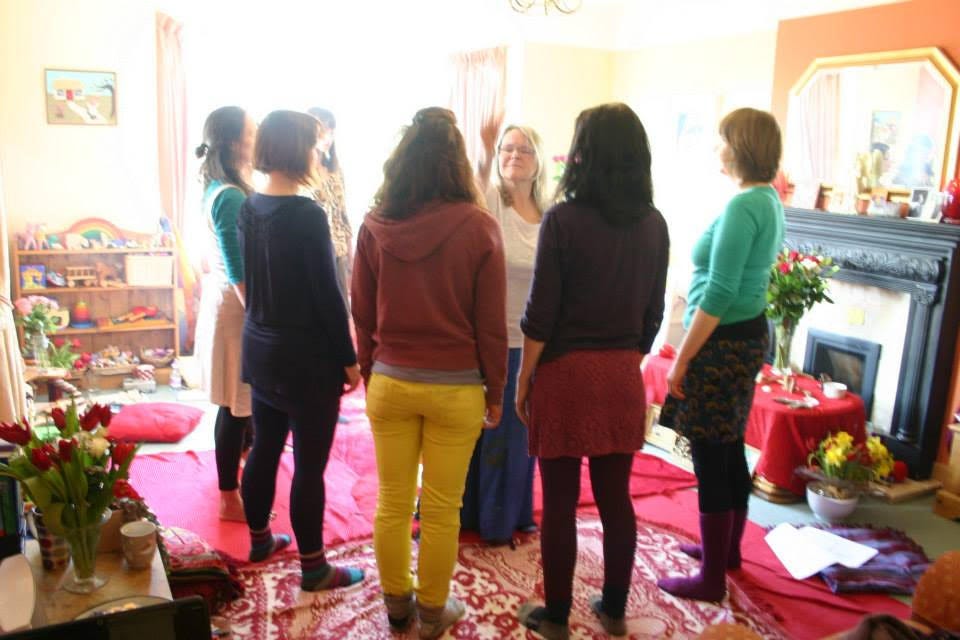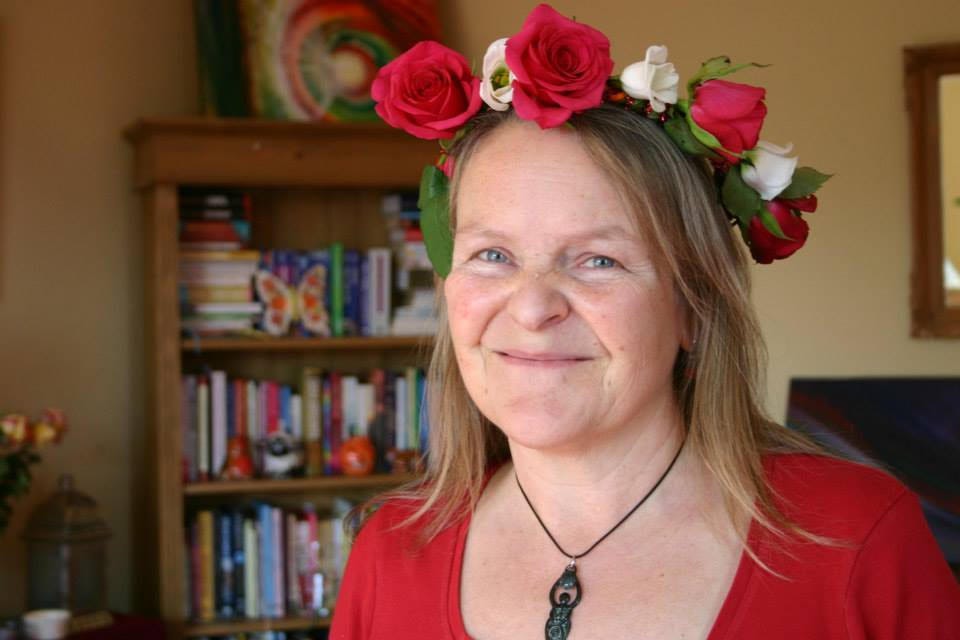Red Tent Bournemouth co-founder and facilitator and homeopathic practitioner, Helen Gialias (pictured above), has brought healing opportunities to many local women. On International Women’s Day, she describes the simple, yet powerful, process that allows women to connect with their own wisdom.
What do Red Tent circles offer women?
They offer women a space to come and just be as they are. There are no expectations. It's very non-judgmental space and it's not about fixing. We do offer workshops but in the women’s circles it's not about giving advice or telling women what to do or how they should be.
It's a space for women to speak and be heard and that space is rare in our everyday lives. Usually when we're speaking, the other person is listening and planning in their heads what they're going to say or what advice they're going to give or thinking, “Oh yes, that happened to me.”
In in the Red Tent, we practice what we call active listening – no agenda, just receiving the words with no need to respond.
It creates this very healing situation for women to speak and be heard without that judgment or needing to be fixed. It is huge. It really is.
Often you see women who through having spoken something that maybe they've never spoken before – maybe only to themselves – it releases something and allows them to access their own inner wisdom. It's very powerful.
And you offer workshops too?
Yes, we do some meditations, we do a bit of movement and dancing. I've been inviting women from the wider community to come and hold space doing things like creative workshops. We've had community singing and sacred sound and gong bath journeys.
We celebrate the wheel of the year events like solstice or equinox quite often, if it falls right. We've done world peace meditations, new moon and full moon ceremonies.
When we first started up, we were doing a lot of teaching around the menstrual cycle and the seasons of the menstrual cycle. And now there's another woman in the community who's done similar trainings to those I’ve done. So we're going to start teaching more on that again. Which is a really lovely thing to do because that's kind of where it all started for me.

How does the support network element work?
The group itself has been a fantastic support for many women. We've done a number of things on the Facebook group. We put callouts on there sometimes when women are in difficult situations and other women offer to cook meals and deliver them. That's happened a lot. If women have just had a baby and are on their own or are in other circumstances where they've needed some support. Making and delivering meals is just such a lovely, nurturing thing to do.
We've also done some community callouts. For example, we did one for menstrual products for homeless women and we collected so many that we also sent some to Calais for refugee women there.
Then we did a call out for clothes and blankets and things for Ukrainian women and children fleeing the war. And that was huge. We had a whole lorry full. The (Red Tent) women really step up.
And we also did a callout for Christmas presents for women, and for children of women, in domestic violence refuges. I'm just always just so grateful and astounded by how the women step up, and we've been overwhelmed, in a good way, by the generosity.
And if women ever ask for help or advice on the group, they always get a fantastic number of answers. We recently had a woman who asked for advice and she posted later on saying, “Thank you all so much, because it just helped me massively.” She didn't know the women who were giving her advice, but it didn't matter, because it is that safe space.
It's beautiful.
Can you say more about how this all started for you?
In 2014 I was doing some training with a woman called Alexandra Pope. She runs Red School, which teaches about menstrual cycle and menopause and helps women and empowers women around those things.
…we are so wise and, when we're given the opportunity and the space and the time to sit with that, our inner knowledge, our inner wisdom, it's just amazing.
I did a leadership training with her, which is about women leaders coming from a feminine place, rather than a masculine place, and based around the menstrual cycle and the kind of journey that women go on from the beginning of their menstrual cycle to menopause and beyond.
Teresa, my co founder, had also done some training with Alexandra Pope and we'd become friends through meeting and decided we'd really like to offer something to women in this area.
Where did the Red Tent movement come from?
There was a woman called Anita Diamont who wrote a book in 1997 called the Red Tent. It was a fictional book about the women in the Bible. Within that story was the red tent – a space where women went to bleed, to celebrate all the different rites of passage in women's lives, to discuss the tribes and business.
When they were bleeding, when women are more deeply connected with their inner knowing, the red tent was a place where they would go into an altered state and envision ways forward for the tribe.
This is fictional but it's based on reality, because most cultures have some tradition of women having a space to retreat to to bleed. In some cultures, it became a place they had to go away to because it was seen as unclean. But originally, it was more of a wisdom space and this novel started a kind of great remembering.
There were some women in the United States who took it up and went, “Oh, you know what, we need these spaces.” And they started up red tents and it just spread.
I think in an article in 2019 it said there was something like 20,000 red tents. And now I should think that's doubled at least.
And the thing with the red tent is there's no formula. You don't have to do anything the same way as someone else has done. It's entirely dependent on the women that set it up. Some some people get together and do craft while some women just do dance and singing. And ours started out teaching the menstrual cycle, but always an integral part of it was women's stories and women's stories being heard. And that became, and has remained, the focus.
What do you get from Red Tent personally?
That's interesting. I really, really love being in circles of women. I get so much from it, because I think women are amazing, and we are so wise and, when we're given the opportunity and the space and the time to sit with that, our inner knowledge, our inner wisdom, it's just amazing.
And when you share in a circle, there's always something for everyone in that circle. It doesn't matter what the woman's sharing about, there's some wisdom, or something that's relevant to you. And it happens every time. It's amazing.
Also for me, the biggest antidote to the world's issues is creating community and this is a way of doing that – of supporting each other. For me, that's the best I can do. I’ve realised I'm not an activist in the in the traditional sense of the word, but my activism is creating community and building community and supporting community.
What advice would you give to your teenage self?
Definitely get into menstrual-cycle awareness because that is life changing. And if you begin that early on, it's just so powerful and very healing. When you start to live in tune with your cycle, as opposed to trying to push against it, you learn to do the things which support your body at the different times. For instance, resting when you're bleeding – which is winter in the cycle – is a big one.
I am still following the cycle. I follow the cycle of the moon now I don’t have my own.
Learning to live in tune with it can really, really help physically. But also on the mental and emotional side of things because it's very empowering to not be hating a central part of who you are as a woman.
With some contraception, when you're on the pill for example, you're not having a natural cycle but it doesn't stop you being able to live in tune with those parts of you and your cycle.
Looking further ahead, women who've practiced menstrual cycle awareness for any length of time have a much easier menopause, because it prepares you for menopause. It balances hormones and makes everything more balanced and helps you understand what you're going through.
Lots of people struggle with premenstrual time – with anger for example – and menstrual cycle awareness helps you understand what that's about and to use it rather than hitting up against it. [The anger is] actually you truly speaking, and you can see what your deeper issues are at that time, because it comes to the surface.
And there's a beautiful creative cycle; if you're a creative person and you're wanting to write or do art, these are things that can also fit in with the cycle of awareness. You learn about the inner critic and how to deal with your inner critic through the cycle as well.
What's your favorite food or place to get food?
My favourite food is basically Greek food because I lived in Greece in my 20s and so I learned how to cook there. I love all the bean stews. When you go to Greece for holidays it's all about the meat. But actually, when you go to people's homes, the vegan food is fantastic. I love the aubergines and baked vegetables in the oven. Loads of olive oil.
Do you have any wellness goals for yourself?
I am still following the cycle. I follow the cycle of the moon now I don’t have my own. So I do still try to rest in the dark moon and see that as the time it would have been when I was bleeding.
And the full moon would be ovulation. I still try to live cyclically like that because it does definitely help. To have that time where you just give yourself permission to rest and then you've got the more energy.
So [one goal is] remembering that, because I don't always remember it. But also, working with my trauma. Probably everybody in the world is working with their trauma. There's so much. I have somatic trauma therapy because I strongly believe it is held in the body. That's not really a goal, though, because there isn't really an end to it.
Red Tent Bournemouth can be found on Facebook and you can find out more about Helen’s homeopathy practice here.





